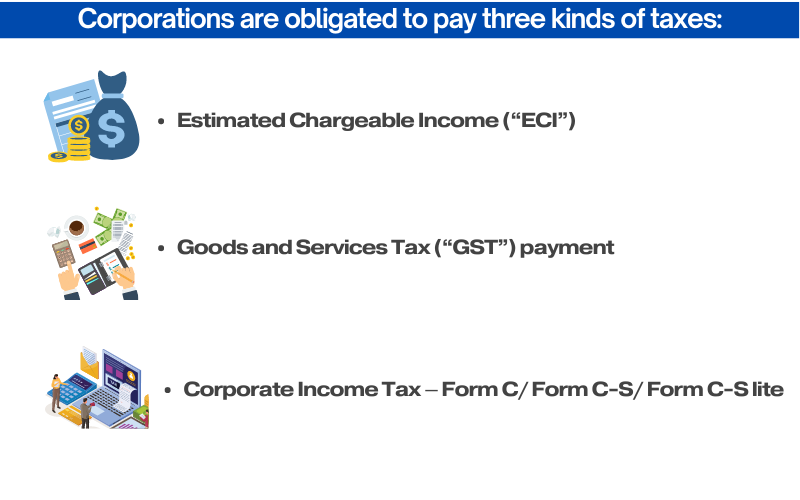Singapore Tax Filing Deadlines for 2023
- Expede Tech
- Apr 9, 2023
- 4 min read
It is important for both Singaporean individuals and corporate entities to be aware of their tax filing obligations to avoid penalties or legal consequences. To provide guidance, this article provides detailed information on the deadlines and procedures for calculating and submitting taxes in 2023.
Essential information regarding deadlines for filing Personal Taxes.
Individuals who are tax residents in Singapore are obligated to pay taxes. This tax residency status applies to Singaporean citizens who live in Singapore (even if they occasionally travel abroad), permanent residents who have a permanent home in Singapore, and foreigners who have resided or worked in Singapore for 183 days or longer during the previous year.
In Singapore, individuals are subject to higher taxes as their annual chargeable income increases. This means that the tax rate increases with higher chargeable income. It is also essential to file taxes on time. The tax return for the year 2023 must be submitted by April 15th based on a calendar-year basis. However, if filing electronically, the deadline is extended to April 18th.
Despite the general rule of tax residents having to pay taxes, there are certain circumstances where they may not have to. For instance, if a Singapore Citizen or Permanent Resident has been employed overseas for a period of time, they may not be required to report their foreign earnings and the money they bring back to Singapore may not be subject to taxation.
Essential information regarding deadlines for filing Corporate Taxes.
In Singapore, a company must pay corporate tax promptly and it covers all the profits earned in the fiscal year. Singapore's corporate tax system is categorized as one-tier, where the tax paid by a company based on its chargeable income is the final tax liability.

Submission of an estimated taxable income amount (ECI).
Singaporean companies are mandated to fulfill a tax obligation called Estimated Chargeable Income (ECI). This entails estimating the company's taxable income for the fiscal year, taking into account allowed deductions for various expenses.

Eligible companies must file their ECI within three months of the end of their fiscal year.
Submission of the Goods and Services Tax (GST).
The Goods and Services Tax (GST) in Singapore, which is similar to the value-added tax used in European countries, is currently set at a rate of 7% for most domestic goods and services. Not all businesses are required to file for this tax as it only applies to specific goods and services. If a business is eligible, they would need to file for GST every quarter, unlike the ECI, which is filed once a year.
Businesses are required to file for GST four times a year, and failure to file on time may result in penalties. To help these businesses avoid such consequences, the Inland Revenue Authority of Singapore (IRAS) provides a GIRO plan. This plan facilitates the automatic deduction of GST payments. However, it is crucial to ensure that sufficient funds are available in the account before the payment deduction date if you are using this plan.
If a company is unable to fulfill its GST tax obligations, they may request an extension. However, the reason for the extension must be valid, and the IRAS has the discretion to approve or deny the request. Moreover, the extension period cannot exceed two weeks.
Submission of Corporate Income Tax - Form C/ Form C-S/ Form C-S lite.
Form C/C-S/C-S Lite is the tax return for a corporate entity, which outlines the company's income. Depending on the type of company, either Form C, Form C-S, or Form C-S Lite must be filed with the IRAS. The deadline for filing any of these forms is November 30th, 2023, and qualifying businesses are required to complete the form even if they are operating at a loss.
Submission of Form C-S.
Small businesses can simplify their tax filing process by using Form C-S, which is allowed by the IRAS. Although this form includes only about half of the information required in Form C, it still requires companies to declare their eligibility, provide details of tax adjustments, and report information from their Financial Statements (FS) where applicable.
When submitting Form C-S, companies must meet certain requirements, such as being incorporated in Singapore, having a revenue of $5 million or less, and having income from all sources taxable at 17% corporate tax. They must also not claim carry-back of current-year capital allowances or losses. The deadlines for submitting Form C-S are November 30th for paper submissions and December 15th for e-filing submissions.
Submission of Form C-S Lite
Form C-S Lite is a tax filing option specifically designed for small businesses in Singapore. To qualify for this option, the company must meet the requirements for Form C-S and have an annual income of $200,000 or less. This form was introduced by IRAS in 2020 and is the simplest of the three forms. The deadlines for submitting Form C-S Lite are November 30th for paper submissions and December 15th for e-filing submissions.
Submission of Form C
Form C is the appropriate tax return form for businesses that surpass the income criteria for Form C-S and Form C-S Lite. As this form is intended for larger corporations, it requires more comprehensive information. Companies that complete Form C are generally obligated to report vital financial and tax details, including tax computation and supporting documentation like audited or unaudited accounts.
Due to the absence of e-filing, companies can only submit Form C via paper submission by November 30th.
Singapore Corporate Tax Filing Procedures

All companies in Singapore must fulfill their obligation to file their corporate taxes to avoid penalties for noncompliance or late filing. To prevent such inconvenience, it is recommended to file personal and corporate taxes on time. If necessary, companies may consider outsourcing tax filing to a corporate service provider to ensure timely submission and minimize the risk of failing to meet their tax obligations.








Comments